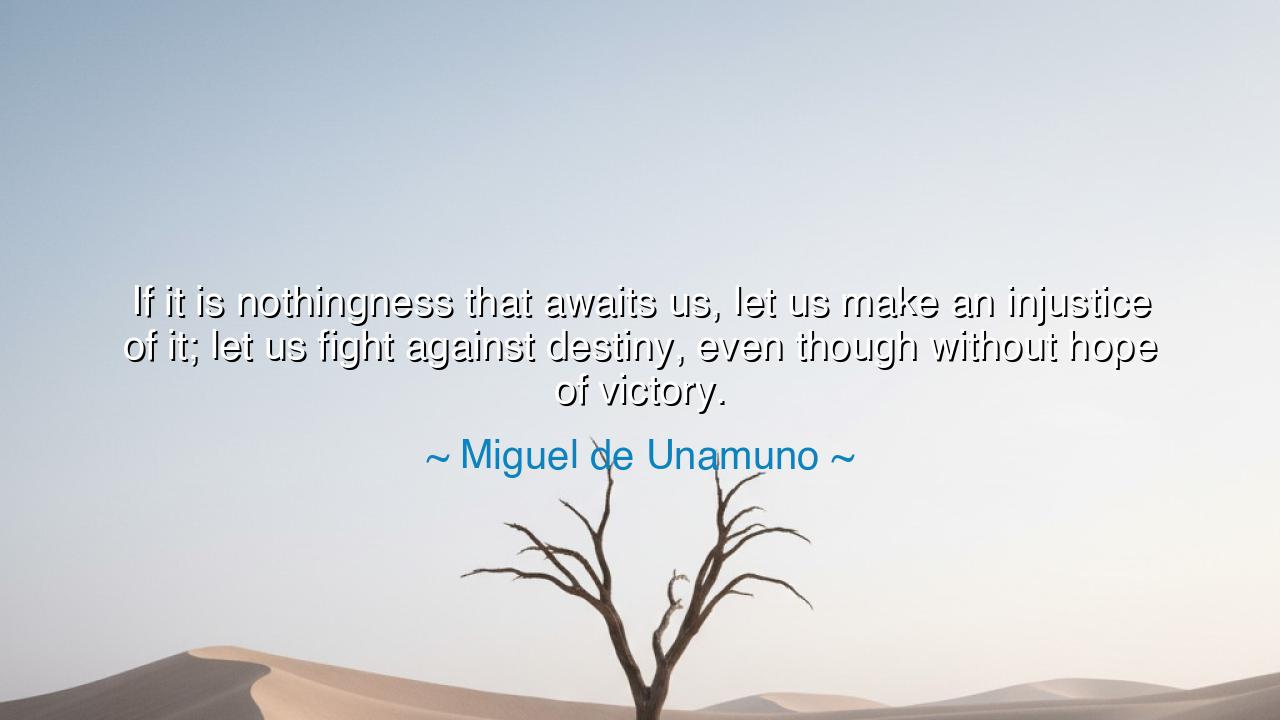
If it is nothingness that awaits us, let us make an injustice of
If it is nothingness that awaits us, let us make an injustice of it; let us fight against destiny, even though without hope of victory.






“If it is nothingness that awaits us, let us make an injustice of it; let us fight against destiny, even though without hope of victory.” Thus declared Miguel de Unamuno, the Spanish philosopher and poet, a man whose soul was forged in the fires of doubt and faith. In this cry, he speaks not as a cold thinker, but as a warrior of the spirit — one who stares into the abyss and refuses to bow. His words burn with defiance, for he teaches that even if life ends in nothingness, even if the universe is silent and indifferent, still man must resist. For to fight without hope, to struggle against despair itself, is to affirm one’s humanity.
Unamuno lived in an age of turmoil, when the faith of Europe trembled under the weight of science, reason, and war. He himself wrestled endlessly with the question of immortality — not as an academic debate, but as a wound in the soul. He could not accept easily that death was the end, yet he could not prove otherwise. And so he resolved to live heroically, to act as if the soul were eternal, even if it were not. In his eyes, this rebellion against nothingness was the highest act of courage — for the man who fights when victory is impossible is greater than the one who fights because victory is assured.
When Unamuno says, “Let us make an injustice of it,” he means that if the universe condemns us to vanish into oblivion, let our struggle itself be a protest against such a fate. Let our consciousness, our compassion, our love of truth be a defiance hurled into the void. To him, even a doomed rebellion is sacred. He believed that to live without faith but with dignity, to love without reward, to seek meaning even in absurdity, is to create meaning through our very defiance. Thus, the fight itself becomes the victory, for it proves that the human spirit will not yield, even to the infinite.
We find the same spirit in the story of Prometheus, the Titan of old who defied the gods to bring fire to mankind. He knew his punishment would be eternal — bound to a rock, his liver devoured each day — yet he acted, knowing the cost. Prometheus, like Unamuno’s man, fought not for triumph, but for the principle of rebellion against injustice, for the dignity of doing what is right even in defeat. His suffering became his glory. So too, Unamuno teaches that if our destiny is death, then every act of courage, every work of love, is an act of divine rebellion — a torch raised against the darkness.
This defiant faith, born from doubt, is not despair but tragic hope — a hope that lives without promise, that loves even in the face of extinction. It is the hope of the soldier who fights though he knows the battle is lost, the artist who creates knowing his work may vanish, the mother who nurtures a child in a dying world. To live thus, Unamuno believed, is to transcend destiny. For though our bodies perish, the greatness of our defiance, our passion for justice, and our yearning for eternity become part of the eternal itself. In this way, the human spirit conquers death, not by escaping it, but by confronting it unflinching.
Unamuno himself lived as he spoke. In the dark years of Spain’s civil strife, when hatred divided his nation, he stood before generals and mobs alike and declared, “You will win because you have brute force, but you will not convince.” He was silenced and imprisoned, but not broken. His final days were lived in solitude, yet even then, his pen burned with life — for he continued to fight against destiny, writing as though his words could outlive the void. He died, as he wished, unyielding — a man who had made an injustice of death by refusing to surrender his soul.
So, my child, learn from Unamuno’s fire. When the world seems meaningless, when death or failure loom like shadows, do not retreat into despair. Resist. If the universe is silent, let your voice be its answer. If eternity denies you, build your own eternity through love, art, and courage. Fight for truth even when it seems lost, for the fight itself gives light to the world.
For this is the meaning of Unamuno’s creed: that man’s greatness is not in victory, but in defiance — not in certainty, but in faith without proof, in hope without guarantee. To fight when all seems lost, to love when love may vanish, to live knowing death awaits — this is the glory of the human soul. And when your final hour comes, you too may say, “If nothingness awaits me, I have at least made of it an injustice — for I have lived, I have loved, and I have fought.”






AAdministratorAdministrator
Welcome, honored guests. Please leave a comment, we will respond soon